Speech is of four types:
चत्वारि वाक् परिमिता पदानि तानि विदुर्व्राह्मणा ये मनीषिण: |
तानि विदुर्व्राह्मणा ये मनीषिण: गुहा त्रीणि निहिता नेङ्गयन्ति तुरीयं वाचो मनुष्या वदन्ति ॥ R.V. 1.164.45 ||
Four are the definite grades of speech: those Brahmans who are wise know them : three deposited in secret, indicate no meaning: men speak the fourth grade of speech.
Vaikhari- It is ordinary verbal speech, the kind we all hear and use daily, is an expression of kriya shakti, the power of action. It is normal every day conversation. It is the vani expression from mouth. It is the only spoken vani. Other three are unspoken and secret.
Madhyama is mental speech, verbalized but unspoken, the internal monologue and dialogue; it expresses jñana shakti, the power of knowledge and wisdom (or lack thereof). Madhyama measures, evaluates, questions, harnessing your rational and emotional minds to formulate the intentions that precipitate into words. Madhyama translates as an idea in the intellect.

Pashyanti, single-minded speech, is perceptible but not particularized. It is the vehicle for iccha shakti, the power of desire. When you speak at the pashyanti level, you are sure of your message; your intentions (selfish or altruistic) are always clear. Felt in subconsciousness. Rishis perceive mantra or knowledge in this stage. It is perceived by yogis in pure form.
Para is pure intention—pure because it is a direct expression of the will of reality, unadulterated by any personal preference. Para is the power of ambika shakti, the supreme Mother Goddess, speech that flows directly from the cosmic creatrix. It is eternal.
Para, Pashyanti, Madhyama and Vaikhari ( परा , पश्यंती , मध्यमा , वैखरी ) are the four successive phases from which sounds pass through before we can hear it or it becomes audible. These are four successive stages of transformations of sound. By these four phases, we can learn about the origination or utterance of a word from the mouth. In Sanskrit, these are called Vani or vaak.
Among these, the three are hidden inside our body but one can experience the fourth i.e Vaikhari speech. First, let's take a quick look at what are they.
Para - eternal, Pashyanti - felt by a sage or a person in his deep consciousness, Madhyama- when it translates as an idea in the intellect, Vaikhari when the Vani is actually verbally expressed through the mouth, The daily spoken language.
Rishis were able to read the mind of other people and were able to communicate with them using these forms of speech. Before speaking, they were able to read the mind. Some examples are Aadi Shankaracharya, Dashineshwar ji, and Rishi Ramana. Without speaking, Shiv ji transferred the knowledge to saptrishis.
The successive phases of Vaak Para, Pashyanti, Madhyama and Vaikhari are explained in Shrimad Bhagavata Purana as follows - :
स एष जीवो विवरप्रसूति: प्राणेन घोषेण गुहां प्रविष्ट: ।
मनोमयं सूक्ष्ममुपेत्य रूपं मात्रा स्वरो वर्ण इति स्थविष्ठ: ॥ SB 11.12.17॥
sa eṣa jīvo vivara-prasūtiḥ prāṇena ghoṣeṇa guhāṁ praviṣṭaḥ
mano-mayaṁ sūkṣmam upetya rūpaṁ mātrā svaro varṇa iti sthaviṣṭhaḥ
This is that perceptible Supreme Lord who infuses life in all and who manifests himself within the nerve -centres or plexuses (chakras) known as Muladhara and others (existing in the internal parts of the human body ). With the prana impregnated with nada (called para speech), he enters the cave (known as adhara chakra ,located near the anus). He proceeds (ahead) assuming the subtle mental form ( known as pashyanti and Madhyama forms of speech in the spiritual plexuses called Manipura and Vishuddhi located at naval and at the throat respectively. He reveals Himself in the mouth in the form of short and long notes, accents ( such as udatta,anudatta and svarita ) and articulate sounds (like the velars , palatals ,dentals etc. ) This is the grossest speech-form (called Vaikhari) of the Vedas and branches.
Para
The meaning of the word Para is highest and in the context of sound, It is the highest eternal sound. So at the very beginning sound comes from an eternal source, which is always present in the Ether. In Hinduism we call it as a Shabda Brahman or Naad Brahma - ( शब्द ब्रह्म, नाद ब्रह्म ). Para Vani is divine which can be heard in the void (Shunyata) state of mind.
The Muladhara Chakra is the place of this Para form of sound from where it originates and reaches to the heart. This is described in following shlokas by author Bhartrhari in his work Vakyapadiya.
विशेषरहिता चेतनमिश्रा सृष्ट्युपयोगिनी जगदुपादानभूता
कुण्डलिनीरूपेण प्राणिनां मूलाधारे वर्तते
varṇādi -viśeṣarahitā cetanamiśrā sṛṣṭyupayoginī jagadupādānabhūtā
kuṇḍalinīrūpeṇa prāṇināṃ mūlādhāre vartate
Without any speciality and with the consciousness Para in the form of Kundalini resides at, originates at the Mulaadhaaracakra where it is called (Para).
कुण्डलिन्याः प्राणवायुसंयोगे परा व्यज्यते
kuṇḍalinyāḥ prāṇavāyusaṃyoge parā vyajyate
Para form of sound manifests with the interaction of Prana-Vayu (vital breath) with Kundalini.
So in the beginning sound starts its journey as constituted of air or vital breath as first stirring of the breath mixed with Kundalini Shakti which is conscious power inside us. We can call it as a chetana shakti also. It is said that Ishita Siddhi is required to master the Para speech.
Pashyanti
After the first stage when this Para vani reaces to heart is called as pashyanti. Manipura Chakra is the seat of this vani. In other words, the language spoken from the heart is called Pashyanti, the faint whispering at the heart.
It is said that the ancient sages used to give the boons and curses with this type of speech
Madhyama
The next stage is called Madhyama is the intermediate stage.It is the speech which comes after some consideration and action done thoughtfully. It is in better words can be described as the speech which is active in the form of contemplation. Madhyama resides in our mind and in intellect. It is believed that the seat of this speech is Anahata chakra.
The Pashyanti Vak thereafter transforms into an internal (antahs-amnivesini), subtle (sukshma) intellectual process (Jnana), the level of thought (buddhi-matropadana), during which the speaker becomes aware (parigrihita) of the word as it arises and takes a form within him.
That sequence of thoughts results in a definite and clear array of words. This is the intermediate stage – The Madhyamā vak, a sequenced but a pre-vocal thought –described as the voice of silence; perhaps best understood as internal speaking. Here, there is no perceptible sound (Nada). The Madhyamā vak is in an inaudible wave or vibratory (spandana) form.
Vaikhari
Vaikhari : This is best explained as a daily spoken language, which do not require much thought. The faculty of speech. Vaikhari is articulate and according to commentary is of the lowest class.
The forms of Vaikhari speech are velars, palatals, dental etc i.e. matras , swaras , varnas ( मात्रा , स्वर , वर्ण ) in grammar. Unlike Para, Pashyanti, Madhyama other people can hear the Vaikhari speech. It is said that Prakriti and Paramatma both manifests through Vaikhari. Vaikhari is a full transformation of Vaak from subtle to gross form.
All the vaikhari sounds are considered as the voice of Brahman only.
Shloka mentioning the transformation of vaak from Yoga-Kundalini Upanishad
परायामंकुरी भूय पश्यन्तां द्वीदलीकृता।
मध्यमायां मुकुलिता वैखर्या विकसीकृता।
पूर्व यथोदिता वाग्विलोमेनास्तगा भवेत। || 3.18-19 ||
That vaak (power of speech) which sprouts in Para. Gives forth two leaves in Pashyanti :buds forth in Madhyama and blossoms in Vaikhari -that vak which has before been described reaches the stage of absorption of sound reversing the above order ( viz . begining with Vaikhari , etc. ).
An interesting shloka about Vaak from the same book:
Whoever thinks that He who is the great lord of that vāk, who is the undifferentiated and who is the illuminator of that vāk is Self; whoever thinks over thus, is never affected by words, high or low (or good or bad).
Vaak or speech is of 4 types - para, pasyanti, madhyama and vaikhari.
When a thought is about to arise in the mind, first arises a subtle vibration signalling the subtle
intention behind the thought. The thought is not even formed, but an intention behind it is
formed in consciousness. So one is not yet consciously aware of the thought. This is para level
(literal meaning: beyond).
Then that thought establishes itself in the mind. It is not yet formulated so as to be expressed
externally. But one is conscious/aware of it as a visualization or an image or as an idea or a
notion in the mind. This is pasyanti level (literal meaning: seeing).
Then that thought is formulated in the mind in some medium (e.g. a language). Mind is aware/
conscious of the thought formulated in that medium. This is madhyama level (literal meaning:
medium).
Then that thought is expressed externally (e.g. spoken words, written words, facial expressions
etc). Now the thought is accessible to the physical senses of others around one. This is vaikhari
level (literal meaning: dispersed).
Written/spoken Words are the grossest level among the 4 levels of speech. They
are used as tools to convey ideas and intentions in one's mind and recreate them in the minds of
other people.
Words may not even mean the same thing to everyone. Structures of words often need a context
to interpret. We interpret them by contextualizing them with our own life experiences,
inclinations and biases

Every morning we select what clothes to wear.
But we rarely select what thoughts to wear on our minds.
Dresses impress others; Thoughts impress us.
Connect with your inner self.

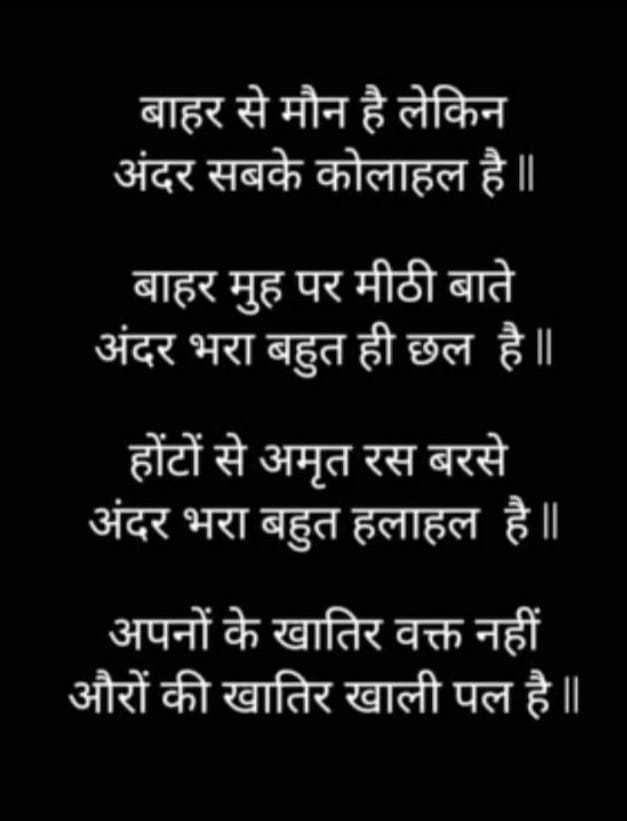
Remember- Sankalp se srishti hai.
Make time for your mental health, make it a priority. We nurture our physical body. However, most important is to nurture our mental sthiti.
Make food with pure thoughts. Thought energy goes to food.
That is why so much importance is given to prasad. When someone is going to a Tirth yatra or a mandir, we tell them to bring prasad for us. Why? Because that prasad is made with pure satvik thoughts. It has pure sattvik energy in it.
How to chant and various methods of chanting
spiritual progress
Contents
-
Methods of chanting – According to the organ
-
Methods of chanting – According to the mode of speech (vani)
2.1 Vaikhari
2.2 Madhyama
2.3 Pashyanti
2.4 Para
2.5 Comparison of chanting in the four modes of speech -
Methods of chanting – According to the types
-
How to chant – According to the organ
A. The body: Writing down The Lord’s Name. The advantage of this is that chanting occurs through all the three media – the hands, eyes, and the mind. When the notebooks on which The Lord’s Name is written are kept in the house, it helps both to purify the house and to maintain its purity.
B. The speech (Vaikhari)
C. The mind
- How to chant – According to the mode of speech (vani)
2.1 Vaikhari
Chanting done aloud, with effort
A. The benefits to oneself.
- In the primary stage chanting aloud facilitates concentration on chanting.
- One also derives benefits of pranayam.
B. The benefits to others
- A sattvik (sattva predominant) spiritual emotion (bhav) can be generated in the minds of those who hear the chanting.
- The sound waves help to make the atmosphere sattvik.
C. The possible distress to others: It can pose as an obstacle to others’ thinking and spiritual practice.
D. The limitations: Since the chanting is aloud, the mind cannot attain the thoughtless state.
2.2 Madhyama
The Madhyama mode refers to chanting which occurs automatically. It is so named as it is the intermediate stage between the Vaikhari and Pashyanti modes.
2.3 Pashyanti
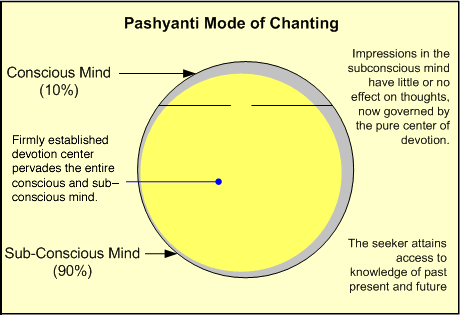
Pashyanti is derived from the root word ‘pashya’ from Sanskrut which means ‘to see’. The chanting akin to that of the seers who have the knowledge of the past, present and future is called Pashyanti.
2.4 Para
This itself is referred to as Omkar or adibija (the primal seed). In the Para mode of speech chanting ceases as non-duality (advait) is achieved with chanting.
2.5 Comparison of chanting in the four modes of speech
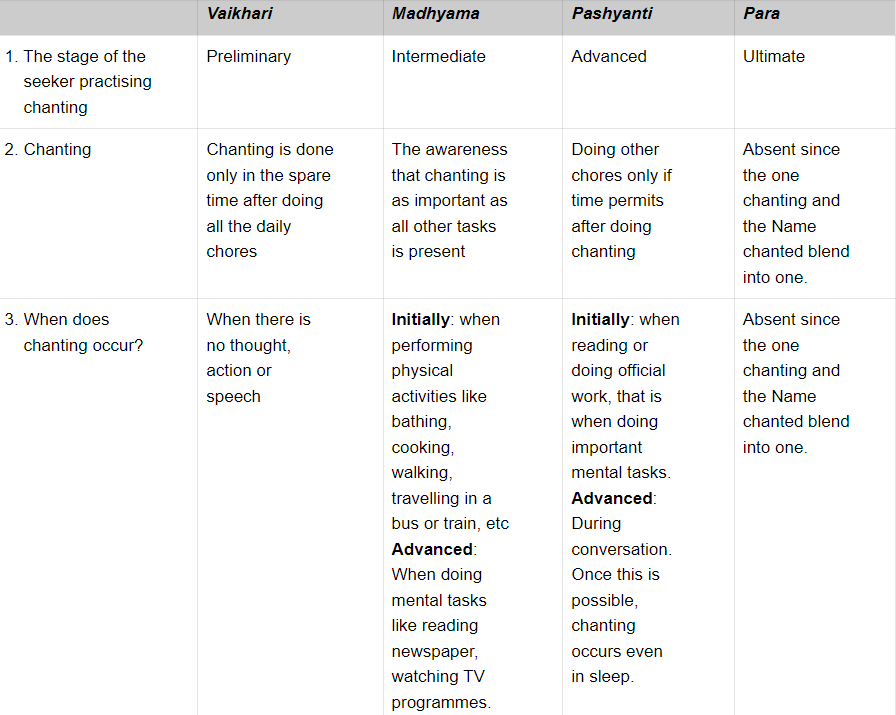
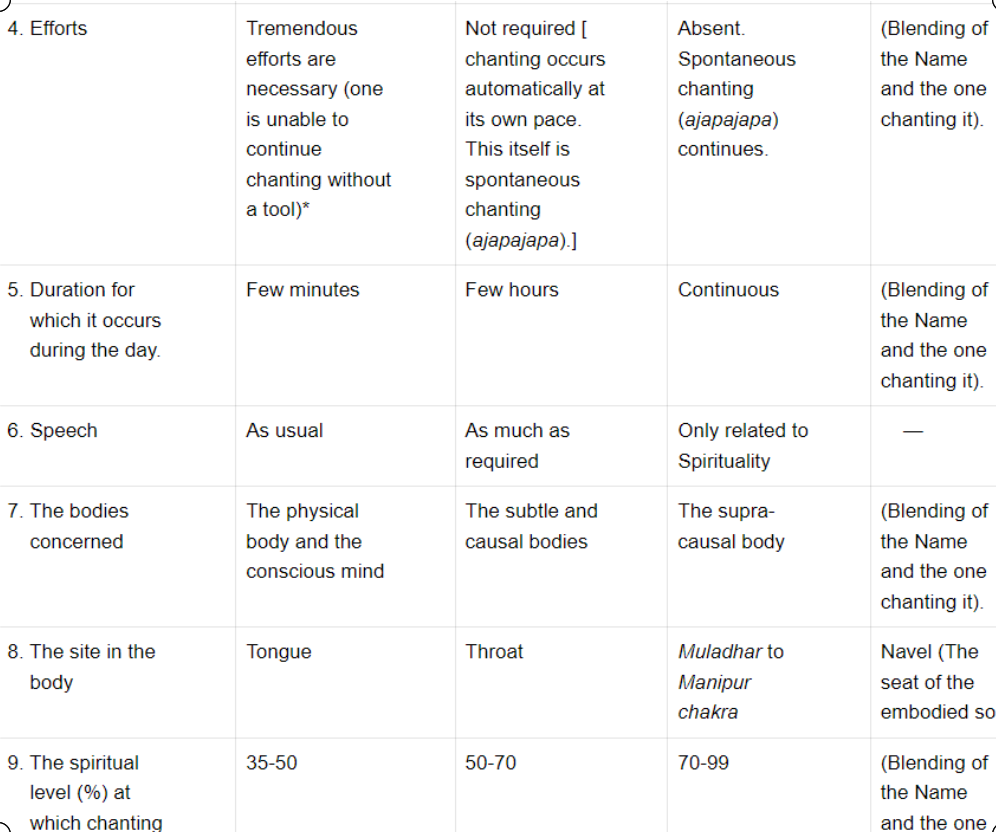
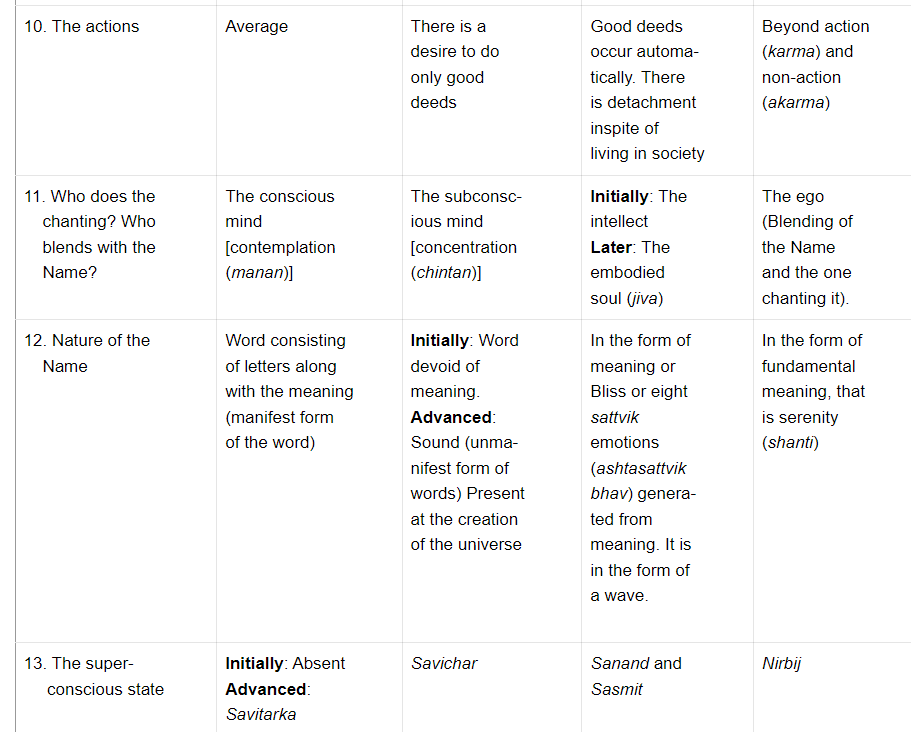
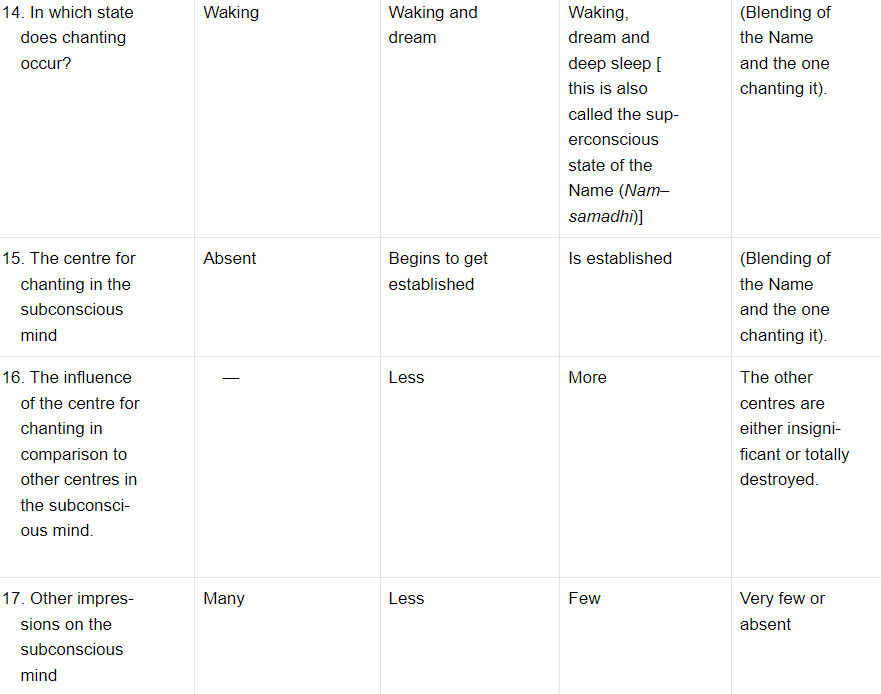
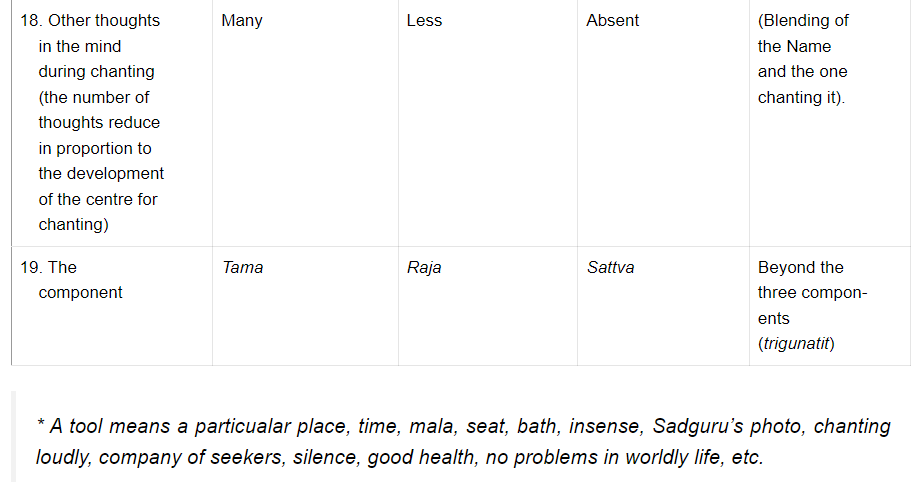
The four modes of speech and time: The Vaikhari mode of speech has the restrictions of the three dimensions of time (past, present and future). Later, this gradually reduces and recitations of the Pashyanti become unidimensional. Some evolved seekers in their usual state say that they performed the Mahagayatri purashcharan, (that is chanting 24 lakhs of the Gayatri mantra) in the morning. The listener may find this odd and label them as eccentric. The reason for this feeling, is that performing a purashcharan which normally takes 6 months at the rate of ten hours per day, in just six hours, is next to impossible. It is only natural that a seeker claiming to have performed a mahapurashcharan in 6 hours or in 6 minutes should be considered eccentric by an average person. However the very concept that these seekers could perform such a purashcharan in the Pashyanti or Para modes (there is non-duality (advait) in the Para mode of speech) is far beyond the imagination of the average individual. Of late, the concept of dimensions such as three dimensional, two dimensional, unidimensional and dimensionlessness are gradually unfolding before modern science. One routinely experiences the miracle when the mind in the three dimensional waking state enters the unidimensional dream state. For instance when one dozes even for half a minute during a spiritual discourse (kirtan) one has a reverie that one is being felicitated in a ceremony, by a crowd. These are common phenomena experienced in hardly thirty seconds. Had these events occurred in the waking state it would have taken a minimum of twelve hours or so. Such is the achievement of Pashyanti.
The more progressed the state the less is the proportion of dimensions. The proportion of dimensions of Lord Brahma, Vishnu and Mahadev is so infinitesimally reduced that thousands of our yugs (eras) elapse in a time which is equivalent to the blinking of Their eyelids.’
- How to chant and Methods of chanting – According to the types
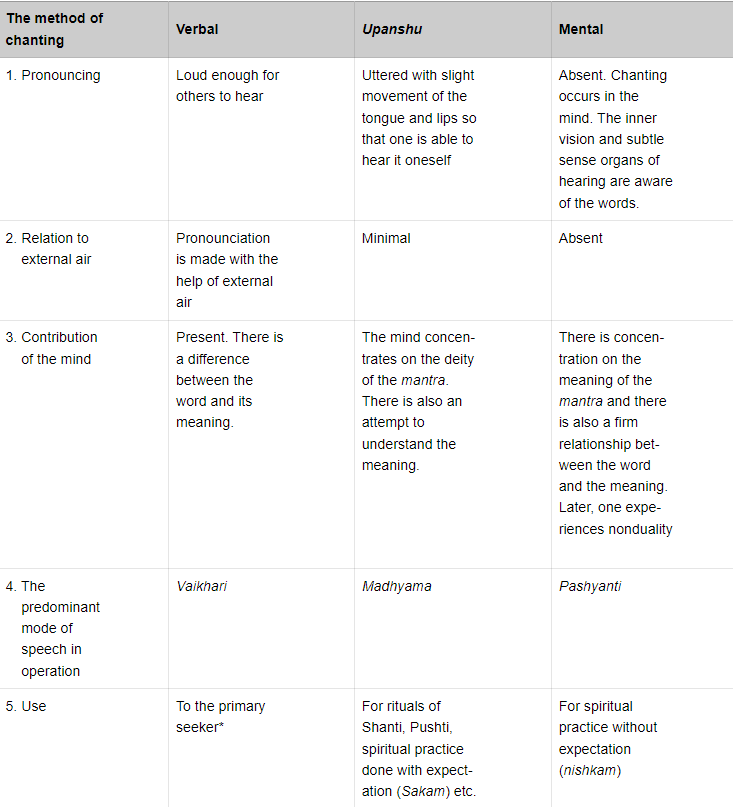
According to the quote, ‘उपांशु स्यात् शतगुण: ।’ (from Manusmruti 2:86) with upanshu chanting one acquires results a hundred times more than those obtained with chanting in the verbal mode.The benefits from mental chanting are significantly more than those obtained with upanshu, as the more subtle the Name, the more is its effectiveness. The difference in the energy generated from audible chanting (Vaikhari or verbal) and that of inaudible sound will be understood from the following example. The radiance generated from chanting in the audible mode for thirty years will suffice to heat one glass of water upto its boiling point. As against this, a mere thirty seconds of inaudible chanting gives the same results.
क ख ग घ ड़ - पांच के इस समूह को कण्ठव्य कहा जाता है क्योंकि इस का उच्चारण करते समय कंठ से ध्वनि निकलती है।
च छ ज झ ञ - इन पाँचों को तालव्य, तालुकहा जाता है क्योंकि इसका उच्चारण करते समय जीभ तालू महसूस करेगी।
ट ठ ड ढ ण - इन पांचों को मुर्धन्य कहा जाता है क्योंकि इसका उच्चारण करते समय जीभ मुर्धन्य (ऊपर उठी हुई) महसूस करेगी।
त थ द ध न - पांच के इस समूह को दन्तवय कहा जाता है क्योंकि यह उच्चारण करते समय जीभ दांतों को छूती है।
प फ ब भ म - पांच के इस समूह को कहा जाता है ओष्ठव्य क्योंकि दोनों होठ इस उच्चारण के लिए मिलते हैं।
Many of us may not even know that the alphabet of Indian languages is full of science. Each letter of the alphabet is logical and placed sequentially with precise calculations. Such a scientific view is not ingrained in the alphabet of other foreign languages e.g. See:
क ख ग घ ઙ - This group of five is called kanthavya because the sound comes out of the throat while pronouncing this. Try pronouncing.
च छ ज ज ઞ - These five are called palate because the tongue will feel palate while pronouncing this. Try pronouncing.
ट ठ ड ઢ ण - These five are called Murdhanya because while pronouncing this the tongue will feel Murdhanya. Try pronouncing.
त थ द ध न - This group of five is called Dantavya because the tongue touches the teeth while pronouncing this. Give it a try
प फ ब भ म - This group of five is called Aushthavya because both the lips meet to pronounce this. Give it a try
अ चानक
आ कर मुझसे
इ ठलाता हुआ पंछी बोला
ई श्वर ने मानव को तो
उ त्तम ज्ञान-दान से तौला
ऊ पर हो तुम सब जीवों में
ऋ ष्य तुल्य अनमोल
ए क अकेली जात अनोखी
ऐ सी क्या मजबूरी तुमको
ओ ट रहे होंठों की शोख़ी
औ र सताकर कमज़ोरों को
अं ग तुम्हारा खिल जाता है
अ: तुम्हें क्या मिल जाता है.?
क हा मैंने- कि कहो
ख ग आज सम्पूर्ण
ग र्व से कि- हर अभाव में भी
घ र तुम्हारा बड़े मजे से
च ल रहा है
छो टी सी- टहनी के सिरे की
ज गह में, बिना किसी
झ गड़े के, ना ही किसी
ट कराव के पूरा कुनबा पल रहा है
ठौ र यहीं है उसमें
डा ली-डाली, पत्ते-पत्ते
ढ लता सूरज
त रावट देता है
थ कावट सारी, पूरे
दि वस की-तारों की लड़ियों से
ध न-धान्य की लिखावट लेता है
ना दान-नियति से अनजान अरे
प्र गतिशील मानव
फ़ रेब के पुतलो
ब न बैठे हो समर्थ
भ ला याद कहाँ तुम्हें
म नुष्यता का अर्थ.?
य ह जो थी, प्रभु की
र चना अनुपम...
ला लच-लोभ के
व शीभूत होकर
श र्म-धर्म सब तजकर
ष ड्यंत्रों के खेतों में
स दा पाप-बीजों को बोकर
हो कर स्वयं से दूर
क्ष णभंगुर सुख में अटक चुके हो
त्रा स को आमंत्रित करते
ज्ञा न-पथ से भटक चुके हो।
I am engaged in the practice of attaining sweetness. I want to instill sweetness in myself by consuming everything in the world. Hey Madhurya! You dissolve in my whole life and make my whole life sweet. I should speak sweetly with my speech. May there be honey on the tip of my tongue and may the root of my tongue be filled with even more honey. Honey Lord! People who don't understand sweetness take shelter of sweetness even just to get work done, so they consider it enough to bring sweetness in outward behaviour, in appearance. They consider it enough to bring it to the tip of the tongue even after keeping malice in the root of the tongue. They express only love and sweetness in the root of the tongue, keeping the disguise inside, but they do not know that bitterness is a million degrees better than sweetness in such deception. In reality no work is accomplished by such false melody. Those poor people do not understand the real immense power of Madhuri, the great power of friendship, the sweet honey that flows from my speech always comes from the root of my speech, from my heart, from the source of my love-filled psyche.
My every deed also showers honey flowers. Hey Madhurya! You are not only involved in my every effort, every movement, every behavior, but you reside in my every thought, every thought, every determination. May each and every resolution of my Aharnish be sweet.
Hey Madho! You become engrossed in my whole heart in such a way that even my state of mind is not affected by it, that is, my every lust should also be filled with sweetness and I can never even dream of hatred, enmity and bitterness in my memory and dreams. O Lord, my form of love and knowledge! I have become a worshiper of your honey form.
Vedic Mantra
jihwaya agre madhu me jihwamule madhulkam
Mamedah Kritavaso Mam Chittamupayasi.
Atharv•1/34/2
Vedic Hymn 1082
Honey flows on this tip of the tongue,
And the root of the tongue is filled with pure honey.
Don't pretend to be selfish by taking cover, don't fill the root of the tongue with hatred,
Bitterness is better than the sweetness of deceit,
Don't do your work with false melody.
To Madhurya…..
who does not understand the sweetness of real love
and to the great power of friendship
can't figure
No matter what the work is, there will be no glory in it.
no work will be proved
neither will be able to get respect.
Oh voice! Premmay Jagale Prat-Pranay
flowed from the source of the mind,
Wake up that Prabha.
To Madhurya
every deed adorned with sweet flowers
You rain continuously through the medium of speech
shed it in every motion attempt behavior
in each thought, in the thought settled it
May there be sweet resolutions, may life be a project
Enjoy it in the heart of the heart.
To Madhurya
Madhuri
There should be no dearth of honey neither in memory nor in dreams.
Arouse the feeling of attachment, hatred or enmity
If evil comes, overcome it with self-power
O giver of knowledge
Haro pain, sorrow, hindrance
Worship the sweet Madhuroop.
To Madhurya
अनुद्वेगकरं वाक्यं सत्यं प्रियहितं च यत् |
स्वाध्यायाभ्यसनं चैव वाङ्मयं तप उच्यते || BG 17.15||
anudvega-karaṁ vākyaṁ satyaṁ priya-hitaṁ cha yat
svādhyāyābhyasanaṁ chaiva vāṅ-mayaṁ tapa uchyate
Words that do not cause distress, are truthful, inoffensive, and beneficial, as well as regular recitation of the Vedic scriptures—these are declared as austerity of speech.
Shanti Mantr
ॐ भद्रं कर्णेभिः शृणुयाम देवाः।
भद्रं पश्येमाक्षभिर्यजत्राः। स्थिरैरङ्गैस्तुष्टुवागँसस्तनूभिः।
व्यशेम देवहितं यदायूः।
स्वस्ति न इन्द्रो वृद्धश्रवाः ।
स्वस्ति नः पूषा विश्ववेदाः ।
स्वस्ति नस्ताक्षर्यो अरिष्टनेमिः ।
स्वस्ति नो वृहस्पतिर्दधातु ॥
ॐ शान्तिः शान्तिः शान्तिः
1: O Devas, May we Hear with our Ears what is Auspicious,
2: O (Devas who are) Worthy of Worship, May we See with our Eyes what is Auspicious
3: With (Sense) Organs Steady and Body Praying (due to Hearing and Seeing the Auspicious)
4: ... May we Attain (i.e. Spend) the Lifespan allotted by the Devas (thus finding fulfillment in our lives)
5: May Indra whose Glory is Great, bestow Well-Being on Us
6: May Pushan who is All-Knowing, bestow Well-Being on Us
7: May Tarkshaya who is a Circle of Protection, bestow Well-Being on Us
8: May Brihaspati (also) bestow Well-Being on Us
9: Om, Peace, Peace, Peace.
मेधा सूक्तम्
तैत्तिरीयारण्यकम् - 4, प्रपाठकः - 10, अनुवाकः - 41-44
ॐ-यँश्छन्द॑सामृष॒भो वि॒श्वरू॑पः । छन्दो॒भ्यो-ऽध्य॒मृता᳚थ्सम्ब॒भूव॑ । स मेन्द्रो॑ मे॒धया᳚ स्पृणोतु । अ॒मृत॑स्य देव॒धार॑णो भूयासम् । शरी॑र-म्मे॒ विच॑र्षणम् । जि॒ह्वा मे॒ मधु॑मत्तमा । कर्णा᳚भ्यां॒ भूरि॒विश्रु॑वम् । ब्रह्म॑णः को॒शो॑-ऽसि मे॒धया पि॑हितः । श्रु॒त-म्मे॑ गोपाय ॥
ॐ शान्ति॒-श्शान्ति॒-श्शान्तिः॑ ॥
May the almighty (universal form), exalted among the Vedas and born of the essence of the Vedas, bless me with wisdom.
May I be blessed with the nectar of immortality; May my body become active. May my tongue speaks soft; May my ears hear everything well. You are the repository of Brahman, and are
hidden by the intellect. May my memory protect me. Om peace, peace, peace.
ओ-म्मे॒धादे॒वी जु॒षमा॑णा न॒ आगा᳚-द्वि॒श्वाची॑ भ॒द्रा सु॑मन॒स्य मा॑ना । त्वया॒ जुष्टा॑ नु॒दमा॑ना दु॒रुक्ता᳚-न्बृ॒हद्व॑देम वि॒दथे॑ सु॒वीराः᳚ ।
May the all-knowing, all-auspicious Goddess of knowledge, be favourably minded to (us), and delighting (in us) visit us.
May we who are helplessly lost in unsuitable speech (duruktân) (before your visit), now as the result of Your delight in us, become enlightened, and also capable of expressing the Truth
with our heroic children or/and disciples.
त्वया॒ जुष्ट॑ ऋ॒षिर्भ॑वति देवि॒ त्वया॒ ब्रह्मा॑-ऽऽग॒तश्री॑रु॒त त्वया᳚ । त्वया॒ जुष्ट॑श्चि॒त्रं-विँ॑न्दते वसु॒ सा नो॑ जुषस्व॒ द्रवि॑णो न मेधे ॥
मे॒धा-म्म॒ इन्द्रो॑ ददातु मे॒धा-न्दे॒वी सर॑स्वती । मे॒धा-म्मे॑ अ॒श्विना॑वु॒भा-वाध॑त्ता॒-म्पुष्क॑रस्रजा । अ॒प्स॒रासु॑ च॒ या मे॒धा ग॑न्ध॒र्वेषु॑ च॒ यन्मनः॑ ।
दैवी᳚-म्मे॒धा सर॑स्वती॒ सा मा᳚-म्मे॒धा सु॒रभि॑-र्जुषता॒ग्॒ स्वाहा᳚ ॥
आमा᳚-म्मे॒धा सु॒रभि॑-र्वि॒श्वरू॑पा॒ हिर॑ण्यवर्णा॒ जग॑ती जग॒म्या । ऊर्ज॑स्वती॒ पय॑सा॒ पिन्व॑माना॒ सा मा᳚-म्मे॒धा सु॒प्रती॑का जुषन्ताम् ॥
मयि॑ मे॒धा-म्मयि॑ प्र॒जा-म्मय्य॒ग्नि-स्तेजो॑ दधातु॒,
मयि॑ मे॒धा-म्मयि॑ प्र॒जा-म्मयीन्द्र॑ इन्द्रि॒य-न्द॑धातु॒,
मयि॑ मे॒धा-म्मयि॑ प्र॒जा-म्मयि॒ सूर्यो॒ भ्राजो॑ दधातु ॥
ॐ हं॒स॒ हं॒साय॑ वि॒द्महे॑ परमहं॒साय॑ धीमहि । तन्नो॑ हंसः प्रचो॒दया᳚त् ॥ (हंसगायत्री)
ॐ शान्ति॒-श्शान्ति॒-श्शान्तिः॑ ॥
Sarasvati Stotram
या कुन्देन्दु-तुषारहार-धवला या शुभ्रवस्त्रान्विता
या वीणा-वरदण्ड-मण्डितकरा या श्वेत-पद्मासना।
या ब्रह्माच्युतशङ्कर-प्रभृतिभिः देवैः सदा पूजिता
सा मां पातु सरस्वती भगवती निःशेष-जाड्यापहा ॥१॥
yā kundendu-tuṣārahāra-dhavalā yā śubhravastrānvitā
yā vīṇā-varadaṇḍa-maṇḍitakarā yā śveta-padmāsanā.
yā brahmācyutaśaṅkara-prabhṛtibhiḥ devaiḥ sadā pūjitā
sā māṃ pātu sarasvatī bhagavatī niḥśeṣa-jāḍyāpahā ..1..
I salute Mother Saraswati who is so pure and white like that of jasmine, moon and a garland of pearls; she is the one who is adorned with sparkling white garments. Whose hands are adorned with the Veena and boon giving staff; who is seated on a pure white lotus. Who is always worshipped by Brahma (the creator), Achyuta (Vishnu or the protector), Shankara (Shiva or the destroyer) and all the devas (gods). Oh Mother Saraswati, the divine one, protect me and dispel all my ignorance.
दोर्भिर्युक्ता चतुर्भिः स्फटिक-मणिमयीम-अक्षमालां दधाना
हस्तेनैकेन पद्मं सितमपि च शुकं पुस्तकं चापरेण ।
भासा कुन्देन्दुशङ्ख-स्फटिकमणिनिभा भासमानासमाना
सा मे वाग्देवतेयं निवसतु वदने सर्वदा सुप्रसन्ना ॥२॥
dorbhiryuktā caturbhiḥ sphaṭika-maṇimayīma-akṣamālāṃ dadhānā
hastenaikena padmaṃ sitamapi ca śukaṃ pustakaṃ cāpareṇa .
bhāsā kundenduśaṅkha-sphaṭikamaṇinibhā bhāsamānāsamānā
sā me vāgdevateyaṃ nivasatu vadane sarvadā suprasannā ..2..
I salute Mother Saraswati who has four hands; She holds a rosary of beads which shines like a crystal (gem). In one hand and a pure white lotus (in the other hand); And in the other two hands she holds a parrot and a book, with pure white lustre like the combination of Jasmine, Moon, Conch and Crystal (Gem), her shining form is incomparable, may she who is the goddess of speech always reside in my mouth (i.e. tongue) and shower her grace.
सुरासुर-सेवित-पादपङ्कजा
करे विराजत्-कमनीय-पुस्तका।
विरिञ्चिपत्नी कमलासनस्थिता
सरस्वती नृत्यतु वाचि मे सदा ॥३॥
surāsura-sevita-pādapaṅkajā
kare virājat-kamanīya-pustakā.
viriñcipatnī kamalāsanasthitā
sarasvatī nṛtyatu vāci me sadā ..3..
Let mother Sarawathi whose feet is worshipped by asuras and devas, who holds a very attractive book in her hands, who is wife of Brahma and who sits on a lotus, always dance on my words.
सरस्वती सरसिज-केसर-प्रभा
तपस्विनी सित-कमलासनप्रिया।
घनस्तनी कमलविलोल-लोचना
मनस्विनी भवतु वरप्रसादिनी ॥४॥
sarasvatī sarasija-kesara-prabhā
tapasvinī sita-kamalāsanapriyā.
ghanastanī kamalavilola-locanā
manasvinī bhavatu varaprasādinī ..4..
Oh goddess Sarswathi born out of water who shines like saffron, who does penance and likes open lotus to sit, who has stout breasts and has shifting eyes like the lotus flower, and who controls the mind , please become my giver of boons.
सरस्वति नमस्तुभ्यं वरदे कामरूपिणि।
विद्यारम्भं करिष्यामि सिद्धिर्भवतु मे सदा ॥५॥
sarasvati namastubhyaṃ varade kāmarūpiṇi.
vidyārambhaṃ kariṣyāmi siddhirbhavatu me sadā ..5..
I salute Goddess Saraswathi who grants blessings and takes forms that she wants, I am starting my education, please always let me succeed in this my venture.
सरस्वति नमस्तुभ्यं सर्वदेवि नमो नमः ।
शान्तरूपे शशिधरे सर्वयोगे नमो नमः ॥६॥
Sarasvati Namastubhyam Sarva-Devi Namo Namah |
Shaanta-Ruupe Shashi-Dhare Sarva-Yoge Namo Namah ||6||
I salute Goddess Saraswathi, salute the Goddess of all, Who is embodiment of peace, who carries the moon, and who is the master of all yoga, and whom I again and again salute.
नित्यानन्दे निराधारे निष्कलायै नमो नमः ।
विद्याधरे विशालाक्षि शूद्धज्ञाने नमो नमः ॥७॥
Nitya-Anande Nira-Adhaare Nisskalaayai Namo Namah |
Vidyaa-Dhare Vishaala-Akssi Shuuddha-Jnyaane Namo Namah ||7||
Salutations to her who is always joyful, who does not have any basis and who does not have any stains, Salutations to her who is the basis of education who has broad eyes and is pure wisdom.
शुद्धस्फटिकरूपायै सूक्ष्मरूपे नमो नमः ।
शब्दब्रह्मि चतुर्हस्ते सर्वसिद्ध्यै नमो नमः ॥८॥
Shuddha-Sphattika-Ruupaayai Suukssma-Ruupe Namo Namah |
Shabdabrahmi Catur-Haste Sarva-Siddhyai Namo Namah ||8||
Salutations to the one whose form is like a clear crystal and who has a micro form Salutations to the voice of God who has four hands and have all accomplishments.
मुक्तालङ्कृतसर्वाङ्ग्यै मूलाधारे नमो नमः ।
मूलमन्त्रस्वरूपायै मूलशक्त्यै नमो नमः ॥९॥
Mukta-Alangkrta-Sarva-Anggyai Muula-Adhaare Namo Namah |
Muula-Mantra-Svaruupaayai Muula-Shaktyai Namo Namah ||9||
Salutations to her who has decorated all her body with pearls and who is the root basis, Salutations to her who is of the form of the root manthras and who is the root power.
मनो मणिमहायोगे वागीश्वरि नमो नमः ।
वाग्भ्यै वरदहस्तायै वरदायै नमो नमः ॥१०॥
Mano Manni-Mahaa-Yoge Vaag-Iishvari Namo Namah |
Vaagbhyai Varada-Hastaayai Varadaayai Namo Namah ||10||
Salutations to her who is spiritual, a great yogi and goddess of words, Salutations to the goddess of sound who holds a hand in blessing and blesses.
वेदायै वेदरूपायै वेदान्तायै नमो नमः ।
गुणदोषविवर्जिन्यै गुणदीप्त्यै नमो नमः ॥११॥
Vedaayai Veda-Ruupaayai Vedaantaayai Namo Namah |
Gunna-Dossa-Vivarjinyai Gunna-Diiptyai Namo Namah ||11||
Salutations to Goddess of knowledge, who has Vedic form and is known by Vedas, Salutations to the Goddess who differentiates between good and bad and is the light of good.
सर्वज्ञाने सदानन्दे सर्वरूपे नमो नमः ।
सम्पन्नायै कुमार्यै च सर्वज्ञे नमो नमः ॥१२॥
Sarva-Jnyaane Sada-Anande Sarva-Ruupe Namo Namah |
Sampannaayai Kumaaryai Ca Sarvajnye Namo Namah ||12||
Salutations to Goddess of all wisdom who is ever joyful and takes all forms, Salutations to the all knowing one who is full of joy and who is full of everything.
योगानार्य उमादेव्यै योगानन्दे नमो नमः ।
दिव्यज्ञान त्रिनेत्रायै दिव्यमूर्त्यै नमो नमः ॥१३॥
Yogaan-Aarya Umaadevyai Yoga-Anande Namo Namah |
Divya-Jnyaana Tri-Netraayai Divya-Muurtyai Namo Namah ||13||
Salutations to her who has the form of Yoga, who is goddess Lakshmi and is the joy got by yoga, Salutations to her who has divine knowledge, who has three eyes and has a divine form.
अर्धचन्द्रजटाधारि चन्द्रबिम्बे नमो नमः ।
चन्द्रादित्यजटाधारि चन्द्रबिम्बे नमो नमः ॥१४॥
Ardha-Candra-Jattaa-Dhaari Candra-Bimbe Namo Namah |
Candra-Aditya-Jattaa-Dhaari Candra-Bimbe Namo Namah ||14||
Salutations to her who wears the half moon and who has the form of a moon, Salutations to her who is equal to Sun and moon and who wears moon as an ornament.
अणुरूपे महारूपे विश्वरूपे नमो नमः ।
अणिमाद्यष्टसिद्ध्यायै आनन्दायै नमो नमः ॥१५॥
Annu-Ruupe Mahaa-Ruupe Vishva-Ruupe Namo Namah |
Annima-Ady-Asstta-Siddhyaayai Aanandaayai Namo Namah ||15||
Salutations to her who has the form of an atom, a big form and a form of the universe, Salutations to her who has the eight occult powers and has the form of joy.
ज्ञानविज्ञानरूपायै ज्ञानमूर्ते नमो नमः ।
नानाशास्त्रस्वरूपायै नानारूपे नमो नमः ॥१६॥
Jnyaana-Vijnyaana-Ruupaayai Jnyaana-Muurte Namo Namah |
Naanaa-Shaastra-Svaruupaayai Naanaa-Ruupe Namo Namah ||16||
Salutations to her who has the form of wisdom and science and is the personification of knowledge, Salutations to her who has the form of different shastras and who has variety of forms.
पद्मदा पद्मवंशा च पद्मरूपे नमो नमः ।
परमेष्ठ्यै परामूर्त्यै नमस्ते पापनाशिनि ॥१७॥
Padmadaa Padma-Vamshaa Ca Padma-Ruupe Namo Namah |
Paramesstthyai Paraa-Muurtyai Namaste Paapa-Naashini ||17||
Salutations to her who is lotus, belongs to the clan of lotus and has the form of lotus, Salutations to the principal goddess who has a divine form and destroys sins.
महादेव्यै महाकाल्यै महालक्ष्म्यै नमो नमः ।
ब्रह्मविष्णुशिवायै च ब्रह्मनार्यै नमो नमः ॥१८॥
Mahaa-Devyai Mahaakaalyai Mahaalakssmyai Namo Namah |
Brahma-Vissnnu-Shivaayai Ca Brahman-Aaryai Namo Namah ||18||
Salutations to the great Goddess, to the great Kali and the great Lakshmi, Salutations to her praised by Brahma, Vishnu and Shiva and the lady of Brahma.
कमलाकरपुष्पा च कामरूपे नमो नमः ।
कपालि कर्मदीप्तायै कर्मदायै नमो नमः ॥१९॥
Kamala-Aakara-Pusspaa Ca Kaama-Ruupe Namo Namah |
Kapaali Karma-Diiptaayai Karma-Daayai Namo Namah ||19||
Salutations to her who dwells in group of lotuses and who can take any desired form, Salutations to the wife of Lord Brahma and who is clever in her work.
सायं प्रातः पठेन्नित्यं षण्मासात् सिद्धिरुच्यते ।
चोरव्याघ्रभयं नास्ति पठतां शृण्वतामपि ॥२०॥
Saayam Praatah Patthen-Nityam Ssann-Maasaat Siddhir-Ucyate |
Cora-Vyaaghra-Bhayam Naasti Patthataam Shrnnvataam-Api ||20||
Shani
इत्थं सरस्वतीस्तोत्रम् अगस्त्यमुनिवाचकम् ।
सर्वसिद्धिकरं नॄणां सर्वपापप्रणाशणम् ॥२१॥
Ittham Sarasvatii-Stotram Agastya-Muni-Vaacakam |
Sarva-Siddhi-Karam Nrrnnaam Sarva-Paapa-Prannaashannam ||21||
Thus this Saraswati Stotram composed by Sage Agastya, Leads to all accomplishments and destroys all sins.
इति श्री अगस्त्यमुनिप्रोक्तं सरस्वतीस्तोत्रं सम्पूर्णम् ॥
Thus ends the Saraswati Stotram composed by Sage Agastya.